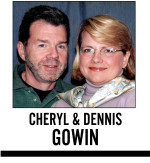Compassion Fatigue
Written by Cheryl & Dennis Gowin on June 30, 2016 at 4:14 pmHow does your day look? Do you have a family member at home for whom you are the main caregiver? On top of that, do you feel the need to volunteer every time there is an event at church? Are you the first to volunteer to bring a cake to a funeral? Is your name first on the list of people to help when there is a crisis in someone else’s life? Are you so busy helping others that you are exhausted?

Cheryl Gowin and Dennis Gowin. Call us at our counseling practice with your feedback, comments, issues, or questions at 434-808-2637.
Did you know that there is a term for how you feel? It is called Compassion Fatigue. Dr. Charles Figley, Tulane University, defined Compassion Fatigue as an extreme state of tension and preoccupation with the suffering of those being helped to the degree that it can create a secondary traumatic stress for the helper.
Caring too much can hurt. When caregivers focus on others without practicing self-care, destructive behaviors can surface. Apathy, isolation, bottled up emotions and substance abuse head a long list of symptoms associated with Compassion Fatigue. While the effects of Compassion Fatigue can cause pain and suffering, learning to recognize and manage its symptoms is the first step toward healing.
Compassion Fatigue affects many people, including pastors and health care workers, as well as those who are primary caregivers for a loved one. As caregivers, we need to remember the importance of taking a break. The Bible tells us to a take a break by making Sunday the day of rest. Jesus took breaks; he often took time to pray and relax with his close friends. Why is it that we don’t take care of ourselves? Being spiritually, emotionally, physically, and mentally healthy, is a requirement for us to be able to help those in our lives who need help. We need to reenergize to care successfully for others.
A common and understandable coping mechanism in care giving is simply to stuff the overwhelming emotions that surface. Eventually, those emotions will refuse to be ignored and may cause a psychological or physical crisis to occur. Once you realize that you are a candidate for compassion fatigue, or are already suffering its effects, exploring this new awareness can lead to insights concerning past traumas, pain, and defeating behaviors.
With support, insightful information, and authentic self-care, you can begin to understand the complexity of the emotions you have been juggling and, most likely, suppressing. Most people never take the time to understand how their life affects them emotionally. Give yourself credit for moving forward and affecting change. Your hard work will pay off.
Healing the symptoms of compassion fatigue is an inside job. In order to move forward on your path to wellness, you must commit to self-care including:
Health-building activities such as exercise, massage, meditation.
Healthy eating.
Practicing the art of self-management, learning to say no.
Developing a support system, people who contribute to your self-esteem, listen well, and care.
Organizing your life so you become proactive as opposed to reactive.
Clarifying your personal boundaries, finding what works for you and what doesn’t.
Reserving your energy, learning to choose your battles.
Living a balanced life, sing, dance, enjoying silence, taking time to have fun.
These are just a few suggestions to begin the process of self-care. As you continue to do the necessary internal work to understand yourself, you will reap the benefits of self-care. Your life will begin to change for the better.
I encourage you to think of your own ways to care for yourself. Remember that you are an important part of God’s plan and one of His desires for you is health.
God is our refuge and strength, a very present help in trouble. Therefore, we will not fear though the earth gives way, though the mountains be moved into the heart of the sea, though its waters roar and foam, though the mountains tremble at its swelling. Psalm 46:1
Cheryl Gowin and Dennis Gowin, Discovery Counseling. Call us if you have any comments or questions; 434-808-2637.



Recent Comments